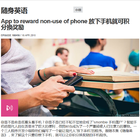
放下手机就可积分换奖励
介绍: Vocabulary: attention and distraction 词汇:注意力和分散注意力的东西
We’re all probably guilty of using our phones a little too often. With the rise of the mobile phone, and later the smartphone, access to communication and information has never been so convenient or temptingOf course, there are those who on...
介绍: Vocabulary: attention and distraction 词汇:注意力和分散注意力的东西
We’re all probably guilty of using our phones a little too often. With the rise of the mobile phone, and later the smartphone, access to communication and information has never been so convenient or temptingOf course, there are those who only pay it any attention when it goes off or sends them an alert. But there are many who find that their phone is a constant distraction.
There's been an abundance of articles recently relating to mobile phone addiction or diversion. In the UK, looking at a mobile phone rather than focussing on the road has been made illegal. Having your attention diverted from driving by a phone carries a stiff penalty. It’s also no coincidence that the word ‘smombie’ has been coined. The word is made up of two: smartphone zombie, and it describes those people who walk around totally captivated by their phone completely unaware of their surroundings.
Smartphone disruption is an issue in schools too. A study by the University of Texas has suggested that just having a smartphone within eyeshot can reduce productivity, slow down response speed and reduce grades, as the eyes of the students keep being drawn away from their work. A second, related study by the London School of Economics has found that students who did not use their smartphones on school grounds saw an increase of 6.4% in test scores.
This issue of productivity and the degree to which smartphones engross young people caused three students from Copenhagen Business school to develop an app to attempt to help combat smartphone fascination. The app, called ‘Hold’, rewards students for time they spend not using the device. For every 20 minutes that a phone is not used between the hours of seven in the morning and 11 at night, its user will accumulate 10 points.
These points can be exchanged for a number of goods and services on the app’s marketplace, with brands such as Caffè Nero, Vue cinemas and Amazon signing up. For example, to earn two free coffees, students will need 300 points. This is the equivalent of 10 hours on the app.
The app has already become the centre of attention in Scandinavia, with more than 120,000 users across Norway, Denmark and Sweden. And soon it will be launched in 170 universities in the UK too.
Could the era of people zoning out on reality and only tuning in to their phones be over? As more and more pay heed, it’s certainly possible. And how else are you likely to be rewarded for not paying attention?




